Pakistan's Erdogan dilemma
Erdogan's Pakistan visit scarred by deportation of Turkish school teachers
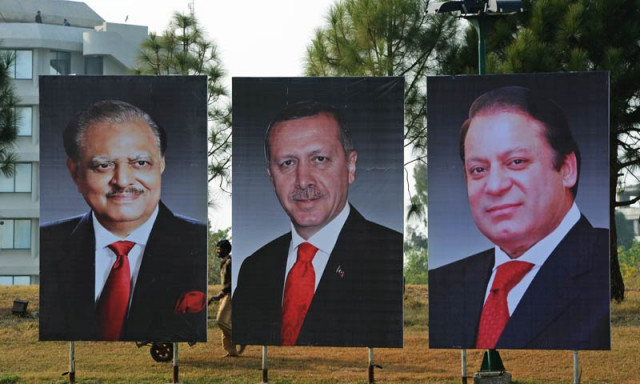
A Pakistani labourer works alongside portraits of Pakistan President Mamnoon Hussain (L) Pakistan Prime Minister Nawaz Sharif (R) and visiting Turkish Prime Minister Recep Tayyip Erdogan (C) on constitution avenue in Islamabad on December 22, 2013. Erdogan is scheduled to pay a two-day official visit to Pakistan from December 23, to discuss economic co-operation between the two countries. AFP PHOTO/Farooq NAEEM
Two days later, the interior ministry notified the foundation that the visa renewal request wouldn’t be entertained. On November 15, the interior ministry ordered the Turkish staff to leave Pakistan no later than November 20. Officials in interior and foreign ministries asserted that the decision was made to please President Recep Tayyip Erdogan, who has been personally pursuing the case.
PTI to reassess its call to boycott Erdogan’s parliament address
Turkey’s YeniBirlik Daily quoted one of Erdogan’s aides İlnur Çevik speaking at a seminar in the University of Management & Technology that if Pakistan delays action against the schools, “President Erdogan needs to pull some people’s ears and admonish them.”
[poll id="1512"]
The audiences were stunned to hear a Turkish dignitary using such aggressive language. So far, it’s anybody’s guess as to whether concerns for Erdogan’s rage or soft reference to support India’s Nuclear Suppliers’ Group led Islamabad to go down hard against the Turkish foundation.
Chief Minister Shahbaz Sharif allotted a piece of land in Lahore a few years ago for the same Turkish NGO, now under rage, to establish a private university of international standards. The project could not materialise due to snail-paced bureaucratic procedures and unexpected events in Turkey.
On December 17, 2013, Istanbul prosecutors charged sons of two ministers while recovering millions of Turkish Lira and US dollars in overnight raids. At the heart of the probe was businessman Reza Zarrab, who was reportedly involved in a money laundering scheme as part of a strategy to bypass United States-led sanctions on Iran. Erdogan termed the anti-corruption operation as a conspiracy hatched against his government by now estranged ally, Fethullah Gulen who is a self-exiled Turkish Islamic scholar based in Philadelphia, US. It was a nasty, public divorce only to engulf Turkey and Turks across the world. Turkey witnessed Erdogan’s steep descent into an authoritarian ruler who bent election laws to his favour, manipulated parliamentary majority to his personal consolidation of power, and either harassed critical journalists by lodging lawsuits for alleged insults or took over virtually all the critical media houses unless they became favourable.
Gulen, the founder of the social service movement commonly known as Hizmet, which Ankara now identifies as Fatehullah Gulen Terrorist Organisation (FETO), is known for his services to education in Turkey and tolerant views of Islam in the age of extremism. Escaping victimisation at the hands of rulers, he fled to the United States in late 1990s but his colleagues and students remained tightly connected with him. Today, his inspired schools exist in over 150 countries, most of which are locally registered and co-founded by Turkish and local philanthropists. Gulen and late Necmettin Erbakan, icon of political Islam in Turkey, never got along well. However, after Erdogan was freed from jail following a soft coup resulting in Erbakan’s resignation from the prime minister’s office, he came closer to Gulen. Though Erdogan never criticised Erbakan publically, the latter could never hide his bitterness for the former Istanbul mayor till his death in February 2011.
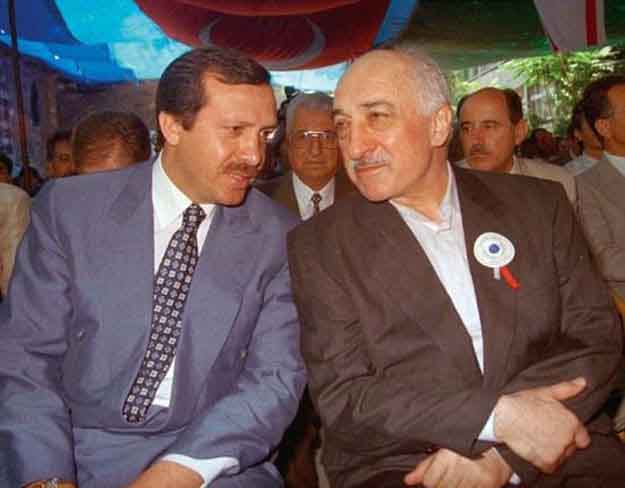 PHOTO COURTESY: DAILY MAIL
PHOTO COURTESY: DAILY MAILErdogan addresses parliament today
His academic and social contribution notwithstanding, Gulen not only remained opposed to the Muslim Brotherhood-Jamaat-e-Islami perspective on Islam and politics but also tried to influence public policy through his followers in bureaucracy, political circles of Erdogan’s Justice & Development Party and the legal fraternity. For instance, Gulen was openly opposed to Turkish flotillas carrying aid for Gaza. The saga eventually ended in tragedy with nine Turkish national martyred, paralysing any possible aid for the blockaded Gaza strip. Gulen and his followers also opposed Turkey’s Syria policy from the beginning. For years, friction between the two unlikely allies did not reach public domain. Following aid to Gaza and Gezi Park protests in Taksim square, the fissures were wide open, eventually culminating in corruption probes leading to recovery of heavy sums of money stacked in cupboards and shoe boxes in the homes of ministers.
Erdogan blamed the July 15 coup attempt on Hizmet while opting not to fire the military chiefs over the damning fiasco. According to the Turkish army chief’s account, a renegade officer involved in the putsch wanted him to speak to Gulen over the phone on the eventful nigh. But General Akar said he refused.
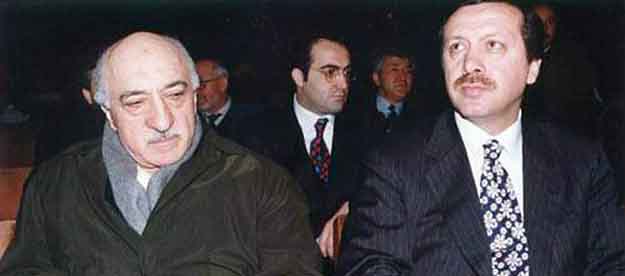 PHOTO COURTESY: DAILY MAIL
PHOTO COURTESY: DAILY MAILTaking clues from such statements and claims, Erdogan has launched a massive crackdown not only in the armed forces but every walk of life including football clubs. So far 180 media outlets have been shut down, 120 journalists arrested, 3,465 judges and prosecutors dismissed and about 28,000 arrested for their alleged role in the failed coup. The country’s judicial system and media are anything but free, particularly after the recent coup attempt.
Erdogan wants the entire world to deport Turkish nationals employed in the Gulen-inspired institution while handing over the facilities to Maarif Foundation, recently created to forward Erdogan’s Muslim Brotherhood-type ideology. As for Pakistan, legally the takeover of 28 schools, enrolling nearly 12,000 students, won’t be possible. Not only is the entity run by Pakistanis and registered as a national NGO but it has also moved the high court against any likely attempt of seizure. A shortcut can be the forced replacement of the board of directors with ones from the recently registered Maarif Foundation.
After months of probe, Pak-Turk International Schools & Colleges have emerged clean and transparent against allegations of indoctrinating students and funneling money to finance Gulen’s exile. The legal recourse against teachers’ deportation decision and forced takeover of the schools can save some face for Pakistan. Otherwise, fate of Pakistan-based Turkish teachers is most likely to be similar to their already arrested colleagues. Over 30 such prisoners have died in Turkey’s jails under mysterious circumstances. Uncertainty about the future must already be taking a toll of their families who are now required to dispose of their belongings and homes till November 20.
Turkish President Erdogan arrives in Islamabad
Ironically, had it been a matter involving any Arab nation, the opposition would have demanded parliamentary debate on the issue. Chickening out under Erdogan’s inflated ego, the Pakistani national conscience is confronted with a few worrisome dilemmas. What if the deported teachers meet the worst treatment while being denied requisite access to a free and fair judicial process? How will Turks look at Pakistan after Erdogan’s days of glory are over like countless other dictators and sultans? Will there be any future for Pak-Turk people-to-people contact rooted in exemplary confidence and warmth?
Until then, welcome to two tainted and corrupt democracies of sorts!
Naveed Ahmad is a Pakistani investigative journalist and academic with extensive reporting experience in the Middle East and North Africa. He is based in Doha and Istanbul. He tweets @naveed360

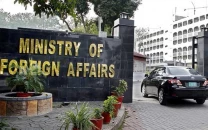
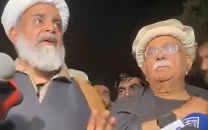


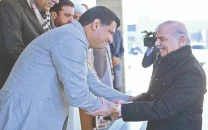













COMMENTS
Comments are moderated and generally will be posted if they are on-topic and not abusive.
For more information, please see our Comments FAQ